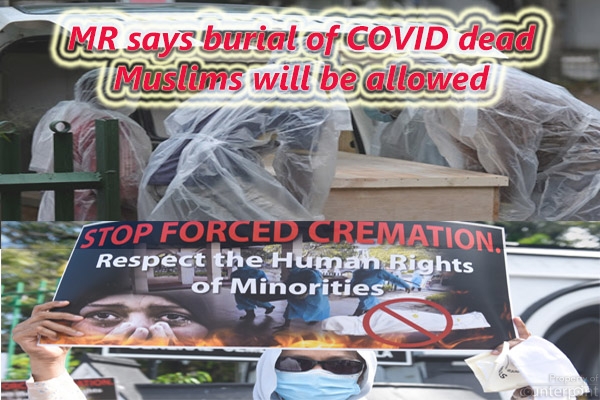The coming UNHRC session and the visit of the Pakistani Prime Minister Imran Khan may have influenced the reversal of the highly divisive policy of not allowing the burial of COVID victims.
Colombo, February 10: The Sri Lankan Prime Minister Mahinda Rajapaksa told parliament on Wednesday, that government would allow the burial of those who had died of COVID, thus ending a 10-month long controversy over the disposal of the bodies of those who had died of COVID-19.
Responding to a question posed by opposition Samagi Jana Balwegaya (SJB) MP, S.M Marikkar, the Prime Minister said that “burials would be permitted.” But he gave no idea as to when the ban will be formally lifted.
Marikkar had pointed to an earlier statement made by Minister Sudharshini Fernandopulle that Covid-19 could not be transmitted via ground water and asked why, in the light of that statement, burials were not being allowed.
Muslims, for whom cremation is “haram” (forbidden or sinful), were distressed over the ban and were agitating to get the order reversed. The government’s contention was that burial of COVID 19 dead would contaminate ground water. The Muslims’ refutation of this with scientific arguments fell on deaf ears.
UNHRC Session
The sudden change in government’s policy now has led to speculation that the March session of the UN Human Rights Council (UNHRC) and the visit of the Pakistan Prime Minister Imran Khan on February 22 and 23, have brought it about.
With a hostile resolution against Sri Lanka at the UNHRC looking increasingly likely, despite on-going talks on a “consensual” resolution, the Lankan government could have thought it prudent to give in on the Muslims’ demand at least.
Pakistan PM’s Visit
Secondly, it would have been considered appropriate to concede this demand ahead of the visit by the Pakistan Prime Minister Imran Khan due on February 22 and 23. Sri Lanka needs Pakistan’s help to get enough votes in the 47-member UNHRC to defeat the West-led Core Group’s hostile resolution against the country. Sri Lanka could count on Pakistan’s support at the UNHRC if it made this concession to the Muslims.
Stinging UN Experts’ Report
In January, UN human rights experts had urged the Sri Lankan government to end its policy of forced cremation of COVID-19 victims, saying it ran contrary to the beliefs of Muslims and other minorities in the country and could foment existing prejudices, intolerance and violence.
The UN Experts were: Special Rapporteur on Freedom of Religion or Belief, Ahmed Shaheed, Special Rapporteur on Minority Issues Fernand de Varennes, Special Rapporteur on the Rights of Peaceful Assembly and Association Clément Nyaletsossi Voule, and Special Rapporteur on the Right of Everyone to the Enjoyment of the Highest Attainable Standard of Physical and Mental Health Ms. Tlaleng Mofokeng.
The Experts said: “Imposition of cremation as the only option for handling the bodies confirmed or suspected of COVID-19 amounts to a human rights violation. There has been no established medical or scientific evidence in Sri Lanka or other countries that burial of dead bodies leads to increased risk of spreading communicable diseases such as COVID-19,” said the experts.
“All of the bodies were cremated according to the fourth amendment of the Provisional Clinical Practice Guidelines on COVID-19 suspected and confirmed patients issued on 31 March 2020.”
“The decision to make cremation mandatory followed alleged expert advice, including that by the chief epidemiologist who claimed that burials could contaminate ground drinking water. However, the World Health Organization has reiterated there is no evidence to suggest that cremation prevents the spread of the disease, while the College of Community Physicians of Sri Lanka and the Sri Lanka Medical Association issued statements recently clarifying that there has been no proof that burial of COVID-19 dead bodies constitutes a public health hazard.”
“While we must be alert to the serious public health challenges posed by the pandemic, COVID-19 measures must respect and protect the dignity of the dead, their cultural and religious traditions or beliefs, and their families throughout.”
“We deplore the implementation of such public health decisions based on discrimination, aggressive nationalism and ethnocentrism amounting to persecution of Muslims and other minorities in the country.”
“Such hostility against the minorities exacerbates existing prejudices, inter-communal tensions and religious intolerance, sowing fear and distrust while inciting further hatred and violence.
“We are equally concerned that such a policy deters the poor and the most vulnerable from accessing public healthcare over fears of discrimination,” the experts said, adding this would further negatively impact the public health measures to contain the pandemic. Information received by the experts indicates that cremation often takes place immediately upon the notification of the test results without granting family members reasonable time or the opportunity to cross check or receive the final test results.”
“There have been several cases of cremations based on erroneous information about COVID-19 test results.”
The President and Prime Minister had instructed the health authorities to explore options for burials in Sri Lanka.
“However, we are concerned to learn that the recommendation to include both cremation and burial options for the disposal of bodies of COVID-19 victims by a panel of experts appointed by the State Minister for Primary Health Services, Pandemics and COVID Prevention was reportedly disregarded by the Government.”
“We strongly urge the Government of Sri Lanka to stop the forced cremation of COVID-19 bodies, to take all necessary measures to combat disinformation, hate speech and stigmatization of the Muslims and other minorities as a vector of the pandemic; and to provide remedy and ensure accountability for cremations that were carried out by error.”
According to media reports, more than 150 bodies of Muslim victims of COVID-19 had been cremated. This list includes Sheyk, a boy only a few days old.
END





